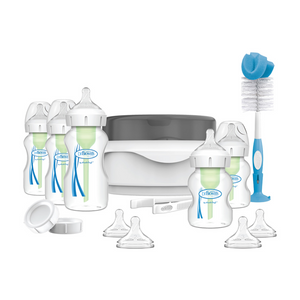
Tips & Tricks to help prevent colic
There are no known reasons why some babies get colic; some doctors think it's a type of stomach cramp. It may happen as babies find it hard to digest food when they are really young, which can be very uncomfortable for them.
Symptoms of colic include:
- Intense crying, lasting several hours. Colic babies typically experience the "Rule of 3s" - crying episodes that last at least 3 hours a day, occur more than 3 times a week for more than 3 weeks
- Clenched fists, arched back, knees being pulled up to tummy
- Red or flushed face when crying
- Inconsolable – nothing you do seems to make it better
Colic can be a difficult experience for both parents and babies, but it usually stops on its own by the time your baby is 6 months old. There are steps you can take to help prevent it. Here are some tips and tricks that may help:
Use Dr. Brown's bottles:
At Baby Central, we understand that colic can be exhausting and extremely upsetting, that's why we offer Dr Brown’s Anti-Colic baby bottles. Dr Brown's Anti-Colic baby bottles are designed with a unique 100% vacuum-free vent system that is clinically proven to reduce windy colic by helping to reduce air intake, which can be a common cause of colic in babies. Keep your baby upright after feeding: Try to keep your baby upright for at least 30 minutes after feeding to help reduce the risk of reflux and colic.
Burp your baby frequently:
Make sure to burp your baby often during and after feedings to help release any trapped air.
Avoid overfeeding:
Overfeeding can cause your baby to take in too much air and increase the risk of colic. Stick to the recommended feeding amounts for your baby's age.
Try a different feeding position:
Experiment with different feeding positions. When bottle feeding, sit your baby up as straight as possible - this helps stop them from swallowing too much air.
Use white noise:
White noise, such as the sound of a fan or a white noise machine, can help soothe your baby.
Keep your baby calm:
Excessive noise and activity can cause overstimulation in babies. It is important to maintain a calm and peaceful environment during feeding time by minimising distractions. Additionally, connecting with other new mothers can provide a valuable support system and help alleviate stress. When a parent is more relaxed, it can make it easier to calm and soothe their baby.
It's important to keep in mind that each baby is unique, and what may be effective for one may not work for another. As the parent of a baby experiencing colic, it can be a draining and distressing experience, but it will eventually come to an end. It's crucial to prioritise self-care, and if feasible, reach out to loved ones for assistance so that you can take regular breaks and recharge.
Related articles


